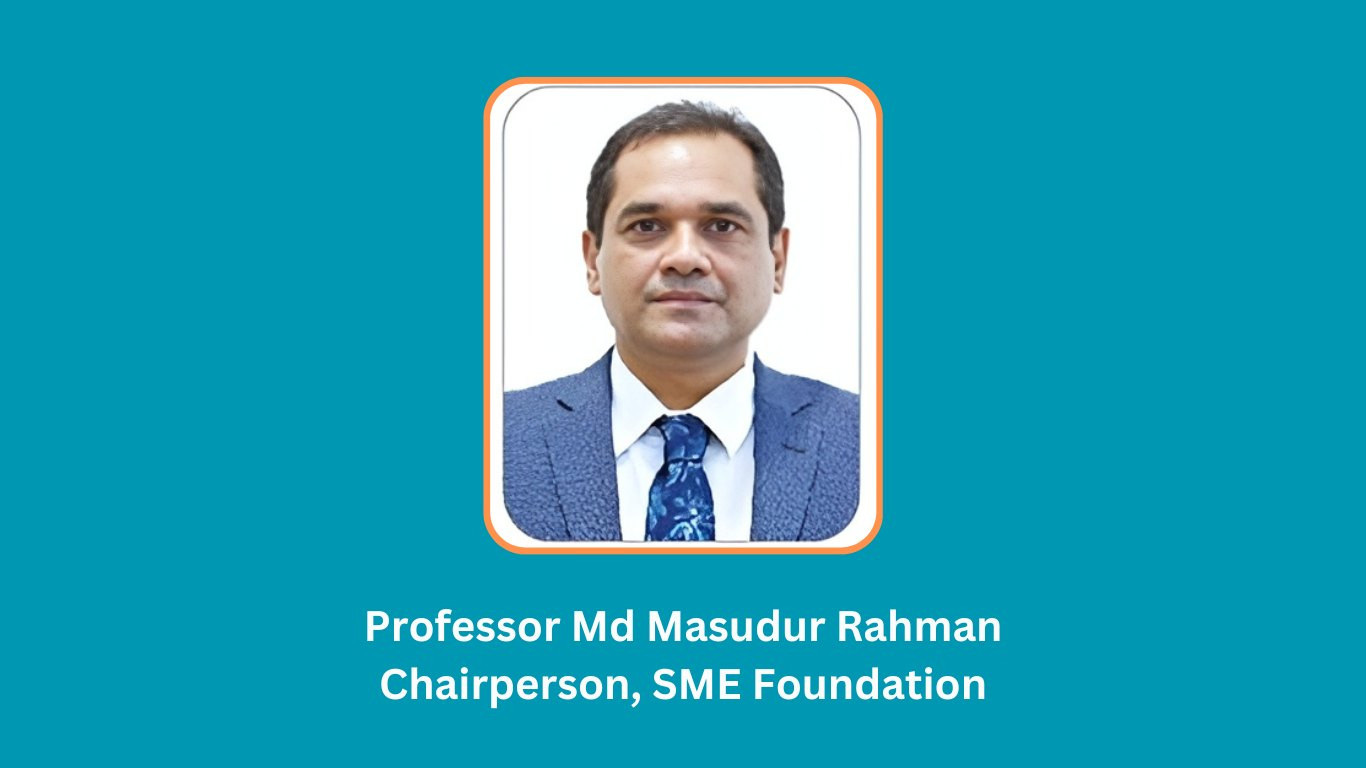SME Foundation started its operations in 2008 and has been working for nearly 16 years, primarily providing policy support and capacity development for SMEs. We have directly and indirectly trained around 20 lakh entrepreneurs through various types of training programmes. Capacity development is crucial for entrepreneurs, and we divide it into several parts: understanding their businesses well, formalising their businesses, updating technology in their production processes, improving product design, managing workers, and enhancing productivity.
International MSME Day
We have directly and indirectly trained around 20 lakh entrepreneurs
In an exclusive interview with the Daily Sun, SME Foundation Chairperson Professor Md Masudur Rahman discussed his organisation’s achievements in the SME sector.
Published: 27 Jun 2024

SME Foundation started its operations in 2008 and has been working for nearly 16 years, primarily providing policy support and capacity development for SMEs. We have directly and indirectly trained around 20 lakh entrepreneurs through various types of training programmes. Capacity development is crucial for entrepreneurs, and we divide it into several parts: understanding their businesses well, formalising their businesses, updating technology in their production processes, improving product design, managing workers, and enhancing productivity.
Apart from training, our major success is initiating the concept of cluster-based industrial development in Bangladesh through the SME Foundation. We are currently working on development in 70 clusters identified from about 200 clusters, employing nearly 6,00,000 people. As a result, the quality and productivity of their products have increased. We have improved the physical infrastructure in these clusters and created market connections to promote their products. Although we are not 100% successful, we have paved the way for market orientation.
SMEs still face many obstacles in obtaining loans. We started offering single-digit loans in 2012, which later became a national initiative. Currently, both government and private banks have simplified the SME loan process, and many banks are eager to provide loans. SME Foundation plays a significant role here. We also work on determining government policies. We have submitted numerous proposals to the NBR to protect local industries, and so far, 70 proposals have been accepted. SME Foundation has established itself as a trusted entity for these entrepreneurs.
Small business owners, especially women entrepreneurs, face significant challenges. Since the early 1980s, women in our country have started contributing to the economy, particularly in the garment industry, which has brought about a radical change in Bangladesh’s economy and social landscape. Middle and upper-class women have also engaged in economic activities, and currently, 43% of capable women are involved in economic activities. While there are still social barriers to women’s involvement in business, people’s attitudes have changed significantly due to the government’s women-friendly policies and priority in lending. However, progress is slow, and we are working to resolve financial problems, create market access, and increase productivity for women entrepreneurs.
SME Foundation has created websites for various clusters. As a non-profit organisation, we work as partners with entrepreneurs. Many self-starting female entrepreneurs in Bangladesh use digital platforms, but creating a Facebook page is not feasible for everyone. Therefore, we have an agreement with Facebook to provide training on technical knowledge and legal aspects for entrepreneurs using the platform.
At our SME fair, 60% of the entrepreneurs are women, and we provide 26% of our total credit to women. We have established women’s chambers across the country.
As much as 90% of GDP comes from private entrepreneurs, who must play a primary role in digitising their businesses. We connect entrepreneurs with platforms like Daraz and Swapno, helping them expand their businesses. If the SME Foundation, the ICT Ministry, and private entrepreneurs work together, an ecosystem will be created, leading to the digitalisation of businesses. Once, after completing education, everyone’s main goal was to secure a job. However, this notion has significantly changed over the past 10-12 years due to ample entrepreneurship opportunities provided by the prime minister. This has encouraged the youth generation, resulting in many new private sector initiatives in manufacturing, services, and trading across the country in the last 15 years. This growth is driven by various government policies.
To sustain this growth in the long term, policy support, financial assistance, and training facilities are crucial. Both government and private sectors need to collaborate to support these entrepreneurs. This initiative has already begun and is expected to accelerate further in the future.
Since its establishment, the SME Foundation has been equipped with 11 strategies. Our main objective is to create and sustain micro, small, and medium-sized entrepreneurs. Our tasks include creating new markets, transferring technology, and connecting entrepreneurs to markets. We have developed AI capabilities suitable for SMEs and work on creating connections with large industries. I believe the foundation’s main role will be to support SME entrepreneurs in meeting the challenges of LDC graduation in 2026.
The foundation faces several obstacles, with financial support dependency being the main problem. Initially, a fund of Tk200 crore was allocated, but no financial aid has been received from the revenue budget. Currently, the scope of our SME activities has expanded significantly, but we lack the necessary financial resources. We need financial support from the government. Although we work with SME entrepreneurs across the country, the foundation has no office outside Dhaka. As a result, entrepreneurs have to travel to Dhaka for services. We need offices at least in divisional cities. With the necessary support, we can overcome these obstacles and increase our activities.

